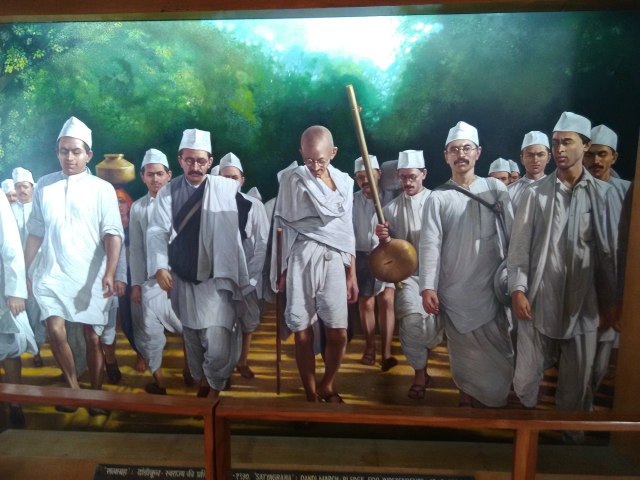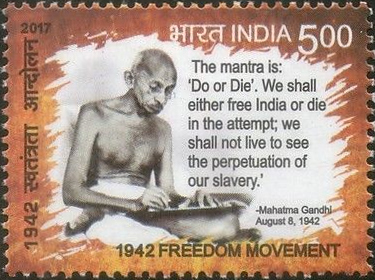August Kranti Day 2024: All you need to know—date, history behind Quit India Movement, significance and more
A movement that paved the way for India's eventual independence in 1947 and remains a cornerstone of India's national identity, inspiring generations to uphold the values of democracy, freedom, and unity.
 The Quit India Movement remains a testament to the courage, unity, and sacrifice of the Indian people in their relentless pursuit of freedom and dignity.Source: Wikipedia Commons)
The Quit India Movement remains a testament to the courage, unity, and sacrifice of the Indian people in their relentless pursuit of freedom and dignity.Source: Wikipedia Commons)Quit India Movement Day 2024 Date and History: August Kranti Day, or Quit India Movement Day, commemorates the historic Quit India Movement, a pivotal moment in India’s struggle for independence from British colonial rule, which called for the immediate withdrawal of British forces from India.
Led by Mahatma Gandhi, this movement called for India’s immediate independence from British rule, aiming to mobilise Indians in a non-violent civil disobedience campaign against British colonialism.
This movement drew a significant turning point in India’s struggle for independence, galvanising millions of Indians from all walks of life to demand freedom and self-governance.
This day serves as a reminder of the power of non-violent resistance and civil disobedience in achieving social and political change, in addition to underscoring the values of democracy, freedom, and unity. Here’s all you need to know about the day.
Quit India Movement Day 2024: Date and History
Quit India Movement Day, observed on August 8th annually in India, commemorates the historic launch of the Quit India Movement on August 8, 1942, under the leadership of Mahatma Gandhi of the Indian National Congress.
This year, the day will be observed on August 8, 2024, falling on a Friday, when ceremonies and events nationwide will honour the movement’s legacy of courage and unity in the fight for sovereignty.
Going back to the roots of history, the Quit India Movement emerged from a backdrop of growing discontent with British rule, particularly following the failure of the Cripps Mission in March 1942, which aimed to secure Indian cooperation during World War II.
On August 8, 1942, during the All India Congress Committee session in Bombay, the Quit India Resolution was adopted, demanding an end to British rule. Gandhi’s clarion call, “Do or Die,” resonated throughout the country, urging Indians to engage in non-violent resistance against colonial authorities.
 Quit India speech by Mahatma Gandhi (Source: Wikipedia Commons)
Quit India speech by Mahatma Gandhi (Source: Wikipedia Commons)
The movement witnessed unprecedented participation across various social strata, uniting students, farmers, workers, and political leaders in a common cause. However, the British response was swift and brutal.
The day after the movement’s launch, key leaders, including Gandhi, Jawaharlal Nehru, and Sardar Vallabhbhai Patel, were arrested, leading to widespread protests, strikes, and acts of civil disobedience across India.
Quit India Movement Day 2024: Significance and Observances
The Quit India Movement holds immense significance in the history of India’s struggle for independence and remains a defining moment in the country’s quest for freedom from British colonial rule.
Unlike previous movements that primarily involved political elites, this movement mobilised millions of ordinary Indians from all walks of life—students, farmers, workers, and women—and demonstrated the unity and determination of the Indian people in their collective aspiration for self-rule and sovereignty.
Internationally, the Quit India Movement drew attention to India’s struggle for independence and garnered support from various quarters, including sympathetic voices within the British public and pressure from Allied powers during World War II.
The movement’s impact on global perceptions of British colonialism contributed to mounting international pressure on Britain to address India’s demands for self-rule.
On Quit India Movement Day, celebrations reflect the nation’s profound reverence for the historic struggle for independence from British colonial rule.
 Procession at Bangalore during Quit India movement, by Indian National Congress. (Source: Wikipedia)
Procession at Bangalore during Quit India movement, by Indian National Congress. (Source: Wikipedia)
Each year, the day is observed with various ceremonies, seminars, and cultural programs across India. These events aim to honour the bravery and sacrifices of those who participated in the movement.
In 2024, as India celebrates the 82nd anniversary of the Quit India Movement, the observances will take place on a Thursday, providing an opportunity for communities to come together in remembrance and reflection.
Beyond commemorative events, Quit India Movement Day prompts introspection and reaffirms India’s commitment to upholding the principles of democracy and equality.
It encourages citizens to reflect on the ongoing challenges facing the nation and to draw inspiration from the past to address contemporary issues of social justice, human rights, and national unity.
- 01
- 02
- 03
- 04
- 05































